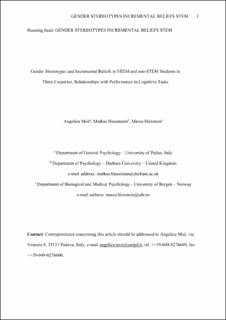| dc.description.abstract | Women’s underrepresentation in science, technology, engineering and mathematics (STEM) has been linked, among others, to gender stereotypes and ability-related beliefs as well as gender differences in specific cognitive abilities. However, the bulk of studies focused on gender stereotypes related to mathematics. The present study, therefore, aimed to map gender stereotypes and incremental beliefs (i.e., the conviction about modifiability) with respect to a wide range of stereotypical male-favouring and female-favouring abilities. Gender stereotypes and incremental beliefs were assessed with self-report questionnaires in 132 STEM students (65 women) and 124 non-STEM students (73 women) in three European countries ranked in the top, middle, and bottom of the Global Gender Gap Report. Moreover, a mental rotation and a verbal fluency test were completed. Men endorsed male-favouring stereotypes more than women, and women endorsed female-favouring stereotypes more than men, an effect that was most pronounced in the country with the larger gender gap. Male STEM students endorsed male-favouring stereotypes more strongly than male non-STEM and female STEM students. Male non-STEM students endorsed female-favouring stereotypes less than female and male STEM students. Female STEM students reported higher incremental beliefs than female non-STEM students, especially in the country with the lowest gender gap. Men outperformed women, and STEM students outperformed non-STEM in mental rotation, while women outperformed men in verbal fluency. Male STEM students’ stronger endorsement of male-favouring stereotypes might reflect genuine group differences, at least in mental rotation. While potentially such gender stereotypes can help creating a “chilly climate” where women in academic STEM degrees are expected to perform poorly, those women believed more in the possibility to change and improve in male-favouring abilities which could help them to overcome the potential negative effect of stereotyping. | en_US |
